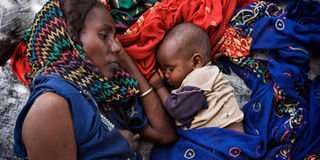Give nutritious food to check malnutrition, donors urged

A sick and displaced woman watches as her malnourished infant sleeps at a health clinic run by the medical charity Medecins Sans Frontieres (MSF) Holland in Kerfi, a site for thousands of displaced Chadians some 50 kilometres south of the eastern town of Gos Beida, June 10, 2008. MSF have urged donors to provide nutritious food aid to help fight malnutrition among children October 15, 2010. FILE
Donors have been urged to provide nutritious food aid to help fight malnutrition among children.
Medicins San Frontieres (Doctors without borders) launched the campaign at a function attended by two MPs and other stakeholders at the Kenyatta International Conference Centre on Thursday evening.
Currently, it said only 1.7 percent of food aid addressed nutrition.
MSF said donors should cease in-kind donations and instead provide cash to finance food aid interventions based on medical needs and at a cheaper cost.
“This is particularly true for the US for whom such a shift could save approximately $600 million-close to double the global amount estimated to focus on malnutrition in any given year,” MSF said in a statement.
It regretted that the current food aid by major donors, Japan, US and Australia lacked necessary vitamins and minerals for children's growth.
The organisation called for the signing of a petition to pressurise the food donors to change their policy and provide adequate food for young children.
It accused the major donors of double standards saying food donated as relief, including maize, was not consumed by children in their countries.
MSF said malnutrition is a medical and humanitarian emergency that accounts for 11 percent of the global burden of disease, contributing to the death of between 3.5 million and five million under age of five annually.
MSF also featured a seven-part mini-documentary series “Starved for Attention” that looks at the issue of malnutrition across the globe.
Ms Maimouna Jallow, MSF Regional Information Officer said there are an estimated 195 million children who are affected by malnutrition worldwide.
“This contributes to at least one-third of the eight million annual deaths of children younger than five years of age. These deaths are preventable if the nutritional requirements of young children are met,” she said.
Ms Jallow said the documentary reveals harsh truth about malnutrition “but also underscores the possibilities, focusing on successful strategies implemented daily to address malnutrition, and how they can, and must, be expanded".
The call coincided with the marking of World Food Day Saturday and coincides with reports of a hunger gap in some parts of the country.
MSF said it treated 250,000 malnourished children last year adding that more than half of the population in Somalia depend on humanitarian aid.
“Following the killing of three MSF staff in Somalia, all international staff have been repatriated from the country, and now operate from outside,” said Ms Fischer Liddle.
She said Somalia has remained dangerous for international staff, where MSF has been providing healthcare to people since 1992.
In 2009, MSF treated 30,400 children in Somalia, and this year at least 6000 children have received treatment. She said malnutrition in Somalia has been worsened by a complex situation resulting from war and climatic changes. Up to 50 percent cases addressed are kwashiorkor malnutrition.
Livestock assistant minister Aden Duale who is also Dujis MPs said malnutrition in Kenya is more pronounced in northern part of the country in areas such as Turkana, and parts of North Eastern Province. He said members of parliament would support MSF in its petition. dubbed ‘Starved for Attention’.
Mr Duale and Turkana Central MP Ekwee Ethuro praised Kenya’s new Constitution terming it a vital tool to ensure devolution of resources to counties, thereby increasing budgets for agricultural activities.
This is expected to reduce malnutrition cases that affect most pastoralist communities. The MPs called for the implementation of the Maputo Declaration, which requires governments to increase the budget to agricultural sector to 10 percent of national budget.
Mr Duale appealed to donors to increase food ingredients for children in their relief food, as most agencies distribute food for grownups, hence contributing to malnutrition among children.
Others at the function were MSF officials Dr Modeste Tamakloe (Medical Director in Djibouti), Karin Fischer-Liddle (Head of Mission, Somalia), Dr Turid Piening (Medical Coordinator, Somalia), Nathalie Ernoult ( MSF Nutrition Policy Advisor, Access Campaign) and Judith Waguma (communications officer, Kenya).
The officials called for reforms of humanitarian food assistance and nutrition programs for malnourished children, and the mobilisation of resources needed to scale up programs to prevent and treat malnutrition.




